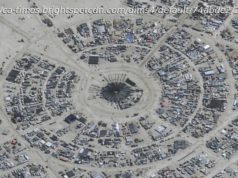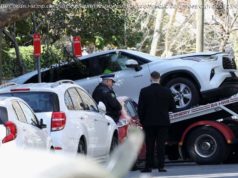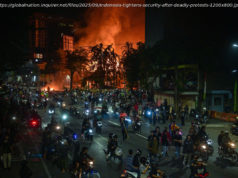Days after Zimbabwe’s first peaceful election after former President Robert Mugabe’s ousting, three people were killed in a deadly protest after armed soldiers were deployed.
On Monday, Zimbabwe held its first elections since the ouster of President Robert Mugabe — and the aftermath has turned deadly.
After the election results showed that the governing ZANU-PF party had won a sweeping majority in Zimbabwe’s parliament, demonstrators supporting the opposition party took to the streets of the capital Harare on Wednesday, saying the election was a sham.
The government deployed Zimbabwe’s military, and witnesses said they saw soldiers beating protesters with makeshift batons, while the demonstrators fought back by throwing stones. The military also used bullets and tear gas, and the brutal clashes have left at least six people dead and 14 injured.
“We condemn in the strongest sense the action that was taken today. There is no justification whatsoever for the brutality we experienced,” Nkululeko Sibanda, a spokesperson for the opposition Movement for Democratic Change (MDC) Alliance, told reporters.
And on Thursday, local police raided the opposition MDC party’s headquarters and accused their candidate of inciting violence .
The deadly clashes have escalated tensions in the country amid an already high-stakes election — and caught some off guard.
The election on Monday was largely peaceful. European Union mission observers found that there was an “improved political climate, inclusive participation rights and a peaceful vote,” according to a preliminary statement. But the report also found that an “unlevel playing field, intimidation of voters, and lack of trust in the process undermined the preelection environment.”
Although the results of the parliamentary vote have been finalized, Zimbabwe’s Electoral Commission has delayed announcing who won the presidential vote, casting more doubt over whether the election was rigged. The commission has said it will expect to announce the results on Thursday.
Monday’s vote passed largely without incident, and many hoped the stability would hold. Zimbabwe’s elections in past years have been marred by widespread violence and fraud, as former President Robert Mugabe clung to power for 37 years. The New York Times reports that in Zimbabwe’s 2008 elections, at least 85 opposition supporters were killed and thousands were left injured .
After Mugabe was ousted in November of last year, the current president, Emmerson Mnangagwa, took over. This year’s presidential race is between Mnangagwa, who has been criticized for his ties to Mugabe, and opposition leader Nelson Chamisa.
The country’s economy has also been a major point of contention throughout the election season, along with other issues, like its relationship with Western powers. Mugabe left Zimbabwe with a faltering economy, and whoever is elected president will likely be under immense pressure to fix it.
Although the Electoral Commission has delayed finalizing the results of the presidential election, it’s legally bound to announce the results by Saturday at the latest.
“The more the presidential vote is delayed, the more it calls into question the population’s confidence in the election process,” Ellen Johnson Sirleaf, a prominent election observer and former Liberian president, told the Washington Post .






